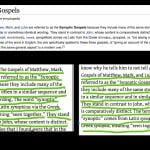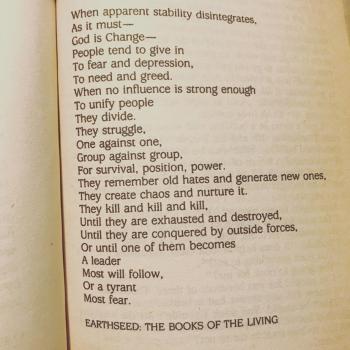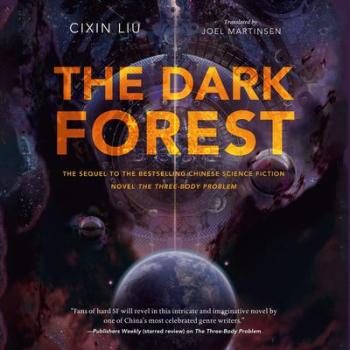The second episode of the second season of Star Trek: Discovery is bound to be a controversial one, but it shouldn’t be. The approach of the Original Series was to depict all StarFleet character as simply uninterested in religion, yet with sudden occasional expression of sentiments in places that then take the viewer by surprise. Discovery instead has characters who specifically self-identify as non-religious, or as pursuing a life based on science – but it also shows Christopher Pike to be an individual who has views about religion and expresses them. Whether these reflect his own personal spiritual path is not made clear. What he does say is that his father was a professor who taught comparative religion as well as science. He quips that that led to some confusion in their household, although it isn’t clear why that should be the case. Sounds like a man after my own heart – and my own vocation! As they continue their conversations about this subject, Pike shares the very interesting tidbit that theologians (at some point between the present day and that fictional future) discussed Clarke’s famous third law and proposed a variation on it, that any sufficiently advanced extraterrestrial entity might be indistinguishable from God.
So can you tell that this episode is a great one and an important one for people with interests like mine? I’m lined up to contribute to a volume about gods on Star Trek, and so this couldn’t have aired at a better time!
Also interesting is the discussion of life as “eternal” in a non-theological sense, referring to the recycling process that happens naturally as living things are fed upon by other organisms and foster new growth. Yet in conjunction with the “mycelial network” on the basis of which Discovery’s spore drive functions, this allows for the possibility not just of reuse of organic matter, but encountering with a dead loved one.
Although he doesn’t appear in the episode as a character, Spock continues to impact the narrative. We learn that he committed himself to the psychiatric facility on Starbase 5, and it is reiterated that he not only sketched the mysterious signals that Discovery is now in pursuit of, but did so before they appeared to anyone else!
Faith is discussed from a number of different perspectives, with Captain Pike being the driving voice in most of those discussions. At one point he makes a quip about the spore drive along the lines that, “If you’re telling me this ship can skip across the galaxy on mushrooms, I’m going to have to take it on faith.” Following the signal coming from the Beta Quadrant, they find humans living on a planet there, with indication that they have been there for 200 years – and thus prior to humanity’s development of warp technology. There is a church visible on the planet, they seem to use no electricity (although a distress beacon continues to operate), and it is calculated that their arrival corresponded with the time of World War Three on Earth. The away team that beams down explores the church, and its stained glass and texts show that their religion was cobbled together from a variety of Earth’s religions. We later learn that an angel rescued those who sought refuge from a nuclear attack taking shelter in the church on Earth, in the year 2053, and they dealt with their religious diversity by combining what they all believed. When Burnham says that “The faith they cling to is a lie,” Pike asks her, “Can you prove that?”
There is a lot of religious language all around in the episode: “Our true salvation.” “God or no God, we are still bound by general order 1” (what later becomes known as the Prime Directive). “The gods have answered our prayers.” “The word angel does carry with it certain implications…I wouldn’t ascribe to it divine properties.” And even on Discovery, Tilly seems to see a “ghost” – although it may simply be due to a concussion.
The religious language is used in a manner that is sometimes reverent, sometimes pointing to mystery, and sometimes subversive – as when the reality that Earth survived WW3 and humans have now developed advanced technology is referred to as a “revelation.” The episode ends with some poignant symbolism, as Pike returns to the planet to admit to Jacob that he was right in his conclusions about them (they had claimed to simply be from the north, others from the planet). Pike trades him a power cell for a soldier’s helmet with a camera on it that promises to have a recording from when they were taken. It provides yet another glimpse of the mysterious “angel” that appears to be the focus of the season. In one final poignant act, Jacob uses the power cell to turn the lights back on in the church that had long lay useless since their technology failed. Faith and science working together.
For other discussions of the faith and science themes in this episode, see IO9, An und für sich, as well as Unsettled Christianity.
What did you think of the episode?













